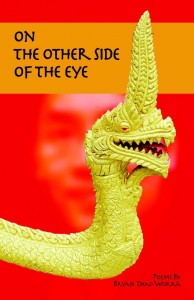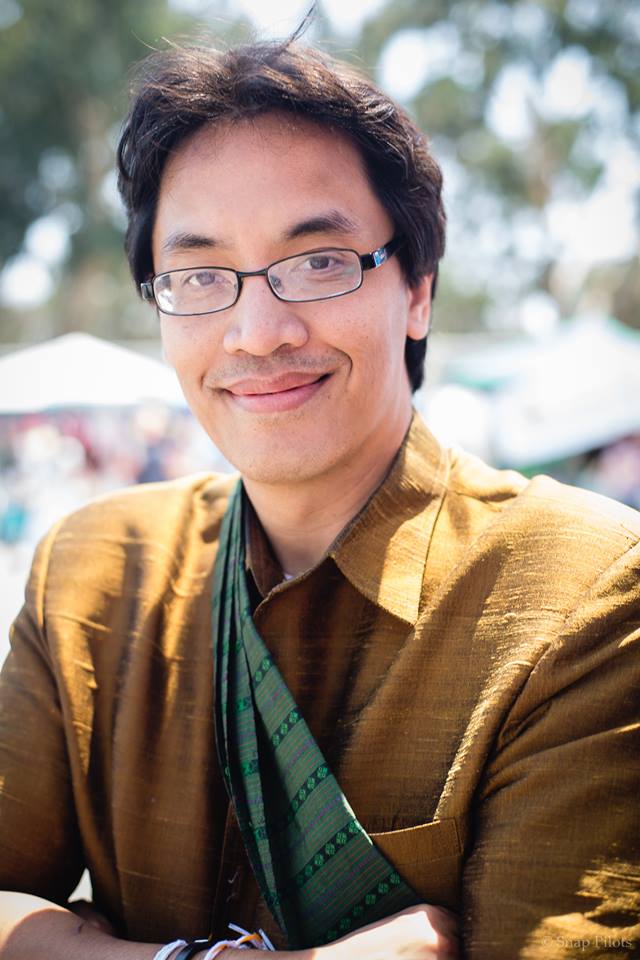Bryan Thao Worra: On Poetry, APALA and Libraries
by Jaena Rae Cabrera
Bryan Thao Worra is a Lao American writer who primarily writes poetry. He has been an APALA member since 2006. He is the first Laotian American to receive a Fellowship in Literature from the National Endowment for the Arts (NEA). Thao Worra’s most recent poetry collection, “Demonstra,” was released in December 2013.
Personal work & influences
Jaena Rae Cabrera (JRC): Please introduce yourself and briefly describe your literary work and career path to date.
Bryan Thao Worra (BTW): Well, hello, everyone. My name is Bryan Thao Worra, and I’m a Lao American writer, primarily a poet with work appearing in over 100 journals and publications internationally. My work has been a part of the London Summer Games, the Smithsonian’s “I Want The Wide American Earth: An Asian Pacific American Story,” and at least one stop on the Minnesota light rail system. I’ve also done numerous articles on the Lao and Asian American community for community newspapers such as the Twin Cities Daily Planet, Asian American Press and lately Little Laos on the Prairie.
My career path, like any writer’s, has been filled with many different stops along the way. I began with Hmong National Development in Washington D.C., tried my hand at a community newspaper for a while, then worked with other non-profit organizations such as Asian Media Access, the Hmong American Institute for Learning, the Lao Assistance Center and the National Youth Leadership Council, to name a few. These days I do a lot of work as a freelance grant writer.
Growing up, I often don’t think I’ve ever been as comfortable in my home as I was in a library or a bookstore. Many of my books were written in libraries and archives where I could have so many vital works at my fingertips.
JRC: How does your own personal diversity influence your writing and/or the diversity of your readership?
BTW: I often wonder about that myself. Hermann Hesse once wrote that a person’s true profession was finding their way to the center of themselves, and I took that to heart. My writing has often been about taking a journey amid so many things that could be an influence on you, and then trying to decide, what will you keep, what will you let define you, what will you redefine. In my own life, when I couldn’t find things that could tell me who I was for certain, it required me to respond to those things that were ‘outside’ of who I was. “Or were they?” as I asked in my first full-length collection, On The Other Side Of The Eye.
I’d been having an interesting conversation lately with some friends that many of my first readers were from outside of my communities. International audiences in London, Singapore, Hong Kong, and France, for example, who were interested in how I was grappling with the issues of the world. What I was seeing, and how I was responding to that. Then, slowly, over time, more and more readers of mine emerged in Minnesota and the rest of the U.S.
It’s been interesting to see so many different corners of the world my readers come from. Italians living in Vientiane, Parisians who love poetry, community activists in Egypt and Washington D.C., fans of science fiction writer H.P. Lovecraft, Lao American torch singers in Tennessee, and a prisoner or two in Reno, etc. I’m thankful it was an early lesson I’d learned: That you can never really be quite certain where your readers will come from in your life, who you’ll have an influence on. In many ways, I liken it to the arc of Japanese American artist Larry Hama, who created the backstory for the G.I. Joe toyline in the 1980s. Few knew he was Asian American during those years, yet what an influence he had on so many!
The right words in the hands of the right person in the right place can change worlds.
JRC: What drew you to poetry?
BTW: Having grown up as a transcultural adoptee, I didn’t have much access to the full details of my birth family’s story. As an adoptee from Laos in the 1970s and 80s, I also didn’t have many resources to turn to about Laos, especially books in our own words. Much of our history had been classified, obfuscated or utterly destroyed in the course of the Secret War for Laos that trying to tell a conventional linear narrative became an exercise in futility for me for many years. Poetry gave me a way to respond to what I –COULD– learn in those years and there were elements of poetry to address many of the ambiguous elements of our story that proved helpful in moving forward as a writer.

APALA & libraries
JRC: How long have you been an APALA member? What benefits does APALA provide to you? What do you feel you bring to APALA, and have you had the opportunity to actively participate in the organization?
BTW: I’ve been a member of APALA since at least 2006, I believe, and I’ve enjoyed keeping abreast of the many different issues my fellow APALA members have faced. As I work with so many archives and other teams building libraries and exhibits that include the Lao American perspective, I’ve been able to network with some amazing figures who inspire me and remind me of our deep potential together. These last few years have been particularly busy for me, but I’m looking forward to the next APALA convening!
JRC: Please describe an instance when libraries and/or archives played a beneficial role in your work.
BTW: Growing up, I often don’t think I’ve ever been as comfortable in my home as I was in a library or a bookstore. Many of my books were written in libraries and archives where I could have so many vital works at my fingertips. When you look for books on the Lao experience, you can’t really walk into a big box bookstore and find much except for a travel guide if you’re lucky, a footnote from a book on the Vietnam War, etc. But the libraries in Minnesota and the archives at UC Irvine or Dallas-Fort Worth were indispensable. Almost a decade later, I’m still using some of the notes I took from the old CAT/Air-America archives in Texas about the daily life in Laos as the old U.S. pilots flying there saw it.
We must not let bookshelves without our stories become symbols of exclusion.
JRC: What advice would you give librarians and information professionals, especially those from diverse backgrounds who work with diverse populations, to promote literacy and readership?
BTW: This probably goes against the grain of many professionals I know who are making a big push to create books featuring characters and stories from diverse backgrounds, but I think we can’t be afraid to show where the gaps are, or what we see in great books outside of our youths’ immediate culture.
As an example I look back at the roots of the Paj Ntaub Voice Hmong Literary Journal, that emerged from a question nearly 20 years ago: “Where were our stories?” The founders were reading and reading voraciously, trying to find themselves. And they could handle good stories from non-Hmong, non-Asian perspectives, but when they saw that gulf, that absence of materials, it stunned them. We can consider ourselves fortunate that they didn’t just accept that, but opted to fill in the gaps themselves if no one else would.
We encourage literacy and readership by developing programming that shows our diverse audiences that they can add their voices to the great body of world arts and letters. Indeed, we expect them to. We must not let bookshelves without our stories become symbols of exclusion. Of course, this can be a daunting dilemma to overcome, but we will all grow from being a part of that journey to solve it.
My writing has often been about taking a journey amid so many things that could be an influence on you, and then trying to decide, what will you keep, what will you let define you, what will you redefine.
JRC: What message would you give to librarians/archivists/writers/artists regarding their value in the field you work in?
BTW: Over the years, as a poet, I’ve learned that my best advice tends to come one-on-one with my students and colleagues. Despite how often the systems seem monolithic, there’s rarely any one-size-fits all advice that I, or anyone, can really offer given the many different unique contexts everyone has. But perhaps one exception might simply be one about the humanity of our fields. To remember to see our work not about gathering, organizing and curating books as so many words on a page, but to get back to the essential core of it all: Souls talking to souls.
The right words in the hands of the right person in the right place can change worlds.
JRC: What current trends in publishing, reading habits, and distribution of library materials concern you the most? What thoughts do you have on these trends?
BTW: Of course, I’m as appalled as anyone by the trend to have more publishers focusing on marketing than editing. We’re seeing far too many badly edited books filled with typos, grammar errors and the like making their way into the market. But even worse than that is just a surfeit of bland ideas. I think that’s corrosive. But we’ve been saying that for centuries. A particular concern for me as a writer, however, is seeing a trend for young readers of color to primarily seek out ‘practical’ books and ‘self-help’ books. While there’s certainly a need and space for them I’d always be concerned they encourage our youth to keep the world as it is, not as it can be.
I’ve also become a little dismayed at a somewhat unspoken trend emerging in archives and collections serving newer American communities where library/archive materials are being vandalized by readers who take umbrage at particular terms or political positions expressed by the authors. It’s been frustrating to find a copy of a particular book I’d been looking for only to find it filled with words crossed out, pages missing, etc. But that’s part of the journey towards democracy, and finding ways to encourage more responsible use of libraries.
I’m thankful it was an early lesson I’d learned: That you can never really be quite certain where your readers will come from in your life, who you’ll have an influence on.
JRC: What are your thoughts on libraries (all types: academic, public, special, etc.) and your thoughts on the role/significance of poetry in a publishing/reading world dominated by prose and audiovisual media (film, television, videos, even social media, etc.)?
BTW: I’m part of a generation that was fortunate to see such a wide variety of information mediums available and how they came and went. So I tend to be more philosophical about it all. I wouldn’t ask most libraries to keep ancient cuneiform regularly on hand, or 8-tracks or Beta tapes or large stacks of VHS tapes. Space considerations and all. But libraries and poets are still essential to democracy. Spaces where one might improve themselves without having to worry, have I bought this or that, do I believe this or that, and so on.
I think we will see more and more libraries making a shift towards becoming presentation and discussion spaces. I don’t think many communities will tolerate moves like some libraries to become ALL e-readers and computer terminals, but we will see a push for greater community engagement. We’re going to have to get imaginative to push through all of this together, but I’m an old-fashioned optimist. I think it can be done, and we’ll have a better society for it.

JRC: What are your thoughts on e-books and libraries? Perhaps in terms of use, circulation and access?
There are a number of countries in Asia where my work would be considered touchy, or sensitive. Or the work of many other authors. A pdf, or some form of an e-book is much easier to secret away than a physical copy of such a work. So I keep open-minded about them, although I know many who are afraid of seeing their work in electronic form. I think the interesting and emerging challenge I’d like to see for libraries is how they can encourage more local books and texts to come forward. Oral histories, photographic archives, etc. that get regularly curated and organized for students and community members to access. There would certainly be a good many files submitted for consideration that might lack historic or literary merit, but I personally think we could benefit from having greater spaces to store and present the better works that deepen the human dialogue.
Writing & publishing
JRC: What advice would you give young professionals, especially those from diverse backgrounds, who are interested in a career in poetry or writing in general?
BTW: There are folks who will tell you there’s no money in poetry or writing. But they’ve been saying that for centuries, and people still write. You have to be open-minded, resilient, and prepared for a journey that often meanders because a writer’s career isn’t linear or certain by any means. Whenever possible, write from the heart, but don’t get burned at the stake for it, unless it’s REALLY worth it.
JRC: With grants and financial assistance being very limited, how do you make your work so readily available to download online for free? What are some financial resources that you use to support your writing?
There’s a classical maxim from Asia, “toss out a brick to attract jade.” I’ve found that to be true. There are a great many poets and writers who’ve been locked into models that teach them “if you’re good at something, never do it for free.” “No man but a blockhead ever wrote, except for money,” Samuel Johnson once sneered. But in the world today, I think successful writers and artists understand that a certain fraction of your work NEEDS to be out there for free. Readers need to be able to sample some of your work before seeking it out. Fortunately, over the years, my readers have also come to see that having a physical copy of my work on hand is also deeply satisfying, and a physical book is more interesting to have signed, than an e-reader.
I’ve been in the fortunate position that poetry and grant-writing for non-profits or writing marketing materials for small businesses often dovetail nicely. One isn’t obliged to overwrite a subject. You need an economy of words and as a poet, you’re trained to use a minimum word count effectively and persuasively.

JRC: How can more authors work with their publishers to release their work in an e-book format?
That’s going to vary from publisher to publisher and what they’ve got set up. Smaller presses will often be more inclined to work with you on it. But you also have to do due diligence and have very clear understanding on your rights. Some larger publishers try to claim that your book is not out of print once it’s in e-book format, so you don’t get your rights back to a book even if the physical version has been out of print for over a decade or so. Or your rights might get sold off in a buy-out, etc. But I think the careful author can make a great go at e-books and try to do it in a way that becomes a win-win-win for the author, the publisher and their readers. Who can ask for anything more?
Editing assistance provided by Melissa Cardenas-Dow and Raymond Wang.

